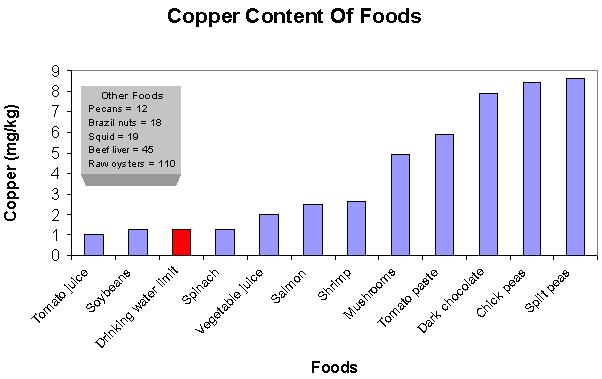Copper Is Essential to Life!
Most people know that metals such as calcium, iron, sodium, potassium and zinc are essential for life. We go to great lengths to ensure that we get enough in our diet by eating fortified foods and taking vitamin supplements containing these metals. However, most people don't know that copper is also essential for life, everywhere on earth. Copper is especially vital for human health. It is required in daily nutrition and is commonly put in vitamin supplements and fortified foods because we might not otherwise get enough in our diet. It is typically available in most domestic water.
Copper is especially important for expectant mothers, developing fetuses and newborns. Numerous metabolic functions critical for life depend on proper consumption of copper. A much more common and serious worldwide problem is copper deficiency due to inadequate levels of copper in the diet or drinking water. Copper deficiency can lead to disease and death.
Like most anything, too much too quick can make you sick at your stomach!
The most serious human health effect of rapid and excessive copper intake from drinking water is short-term stomach upset and/or diarrhea. This upset is caused when high concentrations of copper irritate the lining of the stomach. To protect against these ailments, the U.S. Environmental Protection Agency (EPA) has set a guidance level for the USA limiting copper in drinking water to 1.3 mg/L (parts per million). The World Health Organization, an organization that many countries of the world rely upon for health guidance, has established a 2 mg/L copper guidance level. Literature and ongoing research indicate that both of these guidance levels are protective of human health.
How much copper do we need?
People need more and more copper as they mature. The National Academy of Sciences' Food and Nutrition Board (NASFNB) recommends that children need at a minimum over 0.34 mg/day. The amount of copper needed increases with age until adulthood at which time the recommended minimum needed is 0.9 mg/day for both men and women.
How much is too much copper in water and food?
The NASFNB recommends that you not consume more than 10 mg/day to be safe. The NASFNB has determined that most men, women and children consume less than 1.6 mg/day.
How do foods and beverages compare with the EPA drinking water guideline?
Many common foods are excellent sources of copper, which far exceed the maximum level assigned to drinking water. Our long history of consuming these foods as part of a healthy diet attests to the safety of copper. The fact that many foods and beverages have copper levels equal to or higher than the drinking water limit should make you feel comfortable that when copper levels near the limit they are still safe.

Are there other benefits to having copper in our water?
Studies show that copper tubing can inhibit the food and waterborne pathogen, E. coli O157:H7, that can cause sickness and even death in humans. Copper also inhibits other pathogens like the Polio virus, Salmonella, Legionella, and more.
Can copper ever cause serious health effects?
Unfortunately, yes. In very rare cases, some people may not be able to process copper properly, and this can be life threatening. These cases are due to one of three types of genetic defects. One type of defect causes some people to suffer from copper deficiency (Menkes Disease); the other types of defects render people unable to rid the body of copper, and thus they suffer from copper overdose, even on a normal diet (Wilson's Disease and Idiopathic Copper Toxicosis).
Where can I find out more?
The Copper Development Association Inc. would like to help you with any environmental question pertaining to the use of copper products. If you have any questions, contact us at (212) 251-7200.
